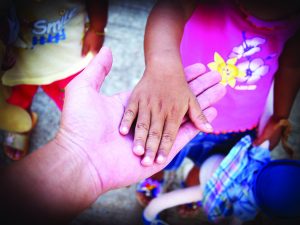What would you do if your daughter or son was suddenly unable to take care of their keiki? Have you ever thought about becoming a parent after retirement? This decision for families is often unexpected and comes under very difficult circumstances. About three million children in the U.S. are being raised by a grandparent. The term “grandfamily” refers to families where grandparents (or other aunties and uncles) take on the full-time responsibility of raising children in the family who are not their own. There are many reasons why this occurs: the child’s parents may be deceased, in jail, suffering from addiction or deployed for work. Every grandfamily is unique in its strengths and challenges. The common thread is that children being raised by a grandparent, instead of entering the foster care system, have been proven to do better in school. Grandfamilies are prevalent in our communities, our culture and across the country, but often need support.
What is the GRANDcares program?
GRANDcares began on Maui and Big Island in 2015. The program is an educational intervention for grandfamilies that is rooted in family resiliency. GRANDcares program is implemented in three phases: strengthening self-care for grandparents, developing communication and leadership skills in grandchildren, and trainings for service providers who work specifically with grandfamilies. The program will launch the second phase called “GRANDcares Youth Club”. This is an interactive seven-week program for keiki ages 8–12 years old being raised by a grandparent. Additionally, the first phase of the program is ongoing and classes for grandparents will run simultaneously. There is no cost to join, but space is limited. For more information or to register email grandcaresmaui@gmail.com.
“One challenge that many local grandfamilies face is that although they have sole re-sponsibility for the children, they often do not have legal guardianship. This can make
it difficult for the grandparents to advocate for the children,” says Heather Greenwood-Junkermeier, UH Mānoa, GRANDcares Program Director.
When a child needs urgent medical attention or needs to be registered for school and their legal guardian isn’t in the picture, Hawaiian law allows a grandparent (or other relative) caregiver to authorize medical or dental care or enroll the child in school, if the child has lived with them for at least six months. Affidavit consent forms are available from your medical office or the DOE, respectively.
GRANDcares HAWAII — UH Mānoa
808-244-3242, Ext 226 | grandcaresmaui@gmail.com
www.grandcares.colostate.edu
Facebook: grandcareshawaii



Leave a Reply